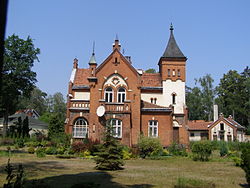Milanówek
| Milanówek | |||
|---|---|---|---|

Borowka Manor
|
|||
|
|||
| Coordinates: 52°7′N 20°39′E / 52.117°N 20.650°E | |||
| Country |
|
||
| Voivodeship | Masovian | ||
| County | Grodzisk Mazowiecki | ||
| Gmina | Milanówek (urban gmina) | ||
| Town rights | 1951 | ||
| Government | |||
| • Mayor | Wiesława Kwiatkowska | ||
| Area | |||
| • Total | 13.52 km2 (5.22 sq mi) | ||
| Population (2008) | |||
| • Total | 15,449 | ||
| • Density | 1,100/km2 (3,000/sq mi) | ||
| Time zone | CET (UTC+1) | ||
| • Summer (DST) | CEST (UTC+2) | ||
| Postal code | 05-822 | ||
| Area code(s) | +48 22 | ||
| Car plates | WGM | ||
| Website | http://milanowek.pl/ | ||
Milanówek [mʲilaˈnuvɛk] is a town and a seat of a separate commune in Poland. Located next to the Grodzisk Mazowiecki County near Warsaw, it is often considered an outlying suburb of the capital of Poland but is in fact an independent entity administratively and culturally. Milanówek is however part of wider Warsaw agglomeration. Located on the Middle Masovian Plain, between Grodzisk Mazowiecki and Pruszkow, the town has approximately 15,449 inhabitants. Milanówek is served by Milanówek railway station.
Milanówek was established in the late 19th and early 20th century as a result of parceling landbelonging to Michał Lasocki, and lying along the Warsaw-Vienna Railway.
Since the beginning, Milanówek was summer resort for wealthy residents of Warsaw, who set up lavish summer homes here that often, when the owners decided to move permanently, were turned into grand villas. The most famous of the early holiday-makers was Polish writer, Boleslaw Prus. Another permanent resident of the town was sculptor Jan Szczepkowski.
Developed in the interwar period, and still dominant in the older part of town, is some residential architecture. In the 20's Central Experimental Station of Silk Production was founded.
During World War II, an urn with the heart of Frédéric Chopin, transferred from Holy Cross Church in Krakowskie Przedmieście in Warsaw, was stored in St. Hedwig Church in Milanówek. During the Warsaw Uprising vital organs of Polish Underground State moved to Milanówek and gave the town the nickname "Little London".
...
Wikipedia



